Economic Impact
Immigrants are essential to the U.S. economy, filling roles from high-skilled tech sectors to agricultural labor and driving economic growth. They also contribute to the tax base and consumer spending. We champion reform that will maximize this effect and create a more diverse and competitive workforce.

As Congress Looks to Next Year, Activists Keep Immigration Reform Alive
Congress takes a holiday break at the end of this week and won’t return from recess until January. This pause in the legislative calendar, however, has little meaning for immigration activists who are continuing to push Congress to act on immigration reform. While the timetable may be changing, the… Read More
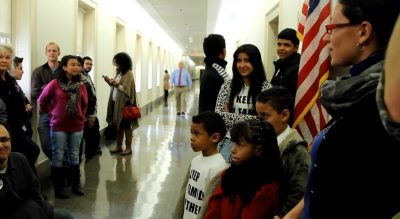
From the Mouths of Babes: Children Demand Immigration Reform
Families across the U.S. are facing the holidays separated from mothers, fathers, and siblings due to deportations and years-long waits for visas. Children—some of whose parents are undocumented immigrants—have taken to the halls of Congress this week to go to congressional offices, meet with members, and ask them to support immigration reform so that their families won’t be separated. Read More
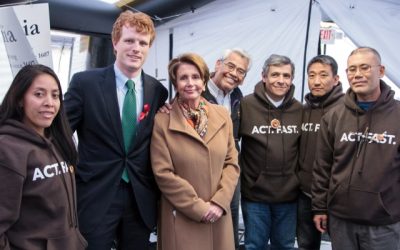
‘Fast 4 Families’ Moves to Next Phase as New Fasters Take the Mantle
On the National Mall today, the four core fasters leading the “Fast 4 Families” ordained new fasters and ended their 22-day, water-only fast. Members of Congress, the faith community and civil and immigrant rights groups turned out to witness the four fasters passing the baton over to others who will continue the fast until House Speaker John Boehner schedules a vote on immigration reform. Read More

Talking Turkey on Immigration 2013
In an effort to preserve harmony at the Thanksgiving table, we have for the last several years offered up tips on making the case for immigration reform in front of, what is for many, the most hostile audience of all—their families. Even in the most congenial of families, there’s likely to be someone who can push your buttons on the immigration issue. But you can, and should, engage them, armed with this year’s advice on talking turkey about immigration reform. Read More
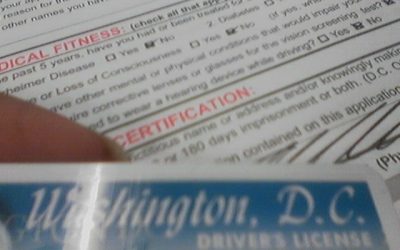
D.C. Follows 11 Other States Allowing Undocumented Immigrants to Drive Legally
As House leaders delay on passing immigration reform that would help millions of immigrants already in the U.S., Washington, D.C., officials are taking steps to improve the lives of undocumented immigrants who call the city home. Last week the D.C. Council passed a bill, written by Council member Mary Cheh, which allows undocumented residents to apply for Driver’s Licenses. D.C. Mayor Vincent Gray signed the bill yesterday. The new policy, which goes into effect May 1, sets up a system where undocumented immigrants will receive licenses that are the same but for their being marked "not valid for official federal purposes." Driver’s licenses for legal residents and citizens will not change. Read More

Understanding DACA’s Education Requirement
When the Deferred Action for Childhood Arrivals (DACA) program was first announced, it was clear that individuals would have to meet some sort of education requirement in order to obtain the program’s many benefits, including a two-year renewable reprieve from deportation, work authorization, a social security number, and—in nearly every state—the chance to apply for a driver’s license. What was unknown was how the immigration agency would address the question of individuals who were unable to finish high school. Would they be categorically excluded from DACA? Or would the agency provide an incentive for those folks to re-enroll in school? Fortunately, the government chose the latter. In doing so, it gave an estimated 400,000 people who met the DACA guidelines but didn’t finish high school a shot at getting DACA. Many of these individuals are thought to be among the 1.2 million who haven’t yet taken advantage of the program. Read More

USCIS to Offer Stay of Deportation to Certain Military Family Members
Today, USCIS issued guidance that is intended to prevent current and former members of the U.S. armed forces from being separated from their noncitizen family members. The memo indicates that the noncitizen family members may be afforded “parole in place.” “Parole in place” is a discretionary tool that… Read More
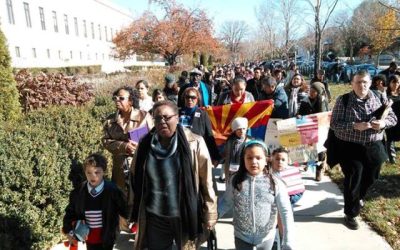
House Inaction Escalates Community’s Demands for Immigration Reform
House Speaker John Boehner (R-OH) reassured a few die-hard anti-immigration reform activists when he said he would never agree to a conference to reach agreement on a House immigration bill and the Senate’s bipartisan immigration that passed in June. But his comments fired up those who want to see Congress improve the nation’s broken immigration system. Despite some in the House dragging their feet on considering immigration reform legislation—House Majority Whip Kevin McCarthy told advocates last week there weren’t enough days for them to act on it this year—immigration advocates in Washington, D.C., and across the country continued to push for the House to act on immigration reform. Read More
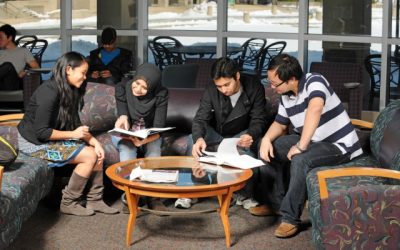
Record Number of International Students Add $24 billion to U.S. Economy
A record number of international students studying in the U.S. contributed billions to the U.S. economy during the 2012-2013 academic year, according to an economic analysis by NAFSA: Association of International Educators. Over the academic year, international students and their families support 313,000 jobs and contributed $24 billion to the U.S. economy. The NAFSA report is based on enrollment data from the latest Open Doors Report from the Institute of International Education (IIE), which found that 819,644 international students studied in the U.S. during the 2012-2013 academic year. A growing number of students from China and Saudi Arabia led the 7 percent increase. And based on NAFSA’s analysis, the jump adds up to a 6.2 percent increase in job support creation and a 10 percent increase in dollars added to the U.S. economy over the previous academic year. Read More

Remembering the Contributions of Immigrant Soldiers this Veterans Day
Immigrants fill every imaginable role in U.S. society. They are found in every profession, from farmworker to brain surgeon. They are the owners of small neighborhood bodegas and the C.E.O.s of high-tech transnational corporations. They represent their communities in town councils and in the U.S. Congress. And, not surprisingly, they are also found throughout the ranks of the U.S. military, fighting on the front lines and shaping policy in the Pentagon. The importance of the myriad roles that immigrants play in the armed forces has only increased since 9/11. In recognition of their service, tens of thousands of foreign-born military men and women have been offered, and taken, an expedited path to U.S. citizenship. These two decisions—to join the U.S. military and to become U.S. citizens—are perhaps the most powerful signs of full-fledged integration into the social fabric of the United States. Read More
Make a contribution
Make a direct impact on the lives of immigrants.
